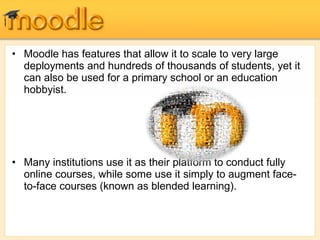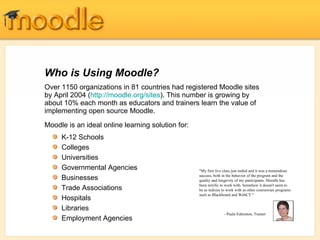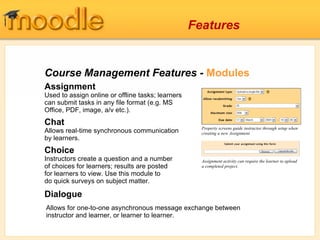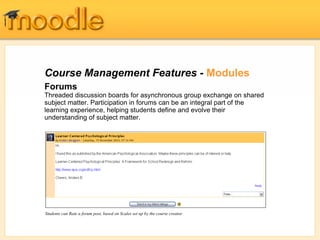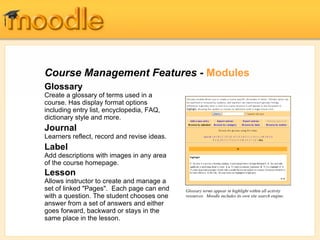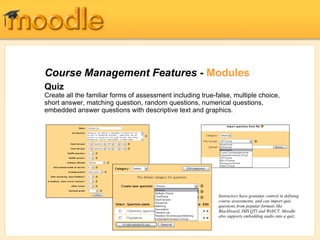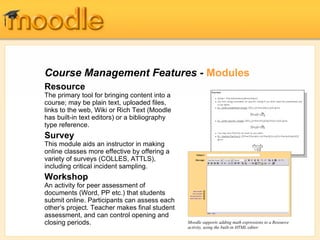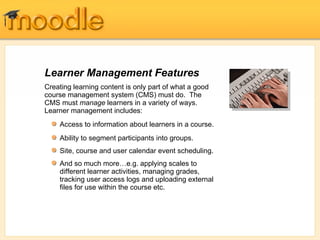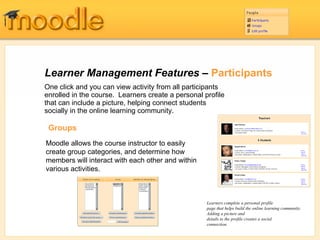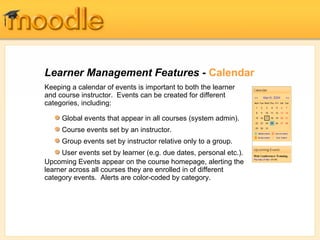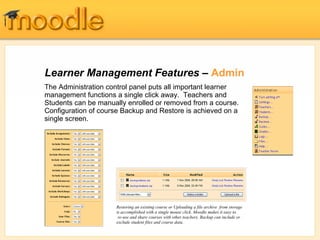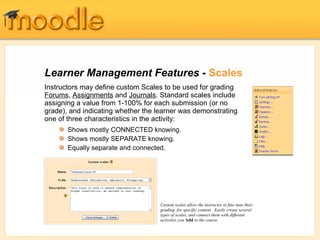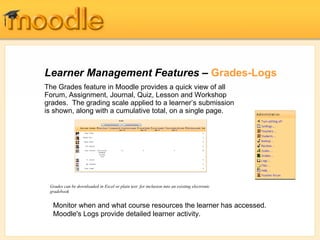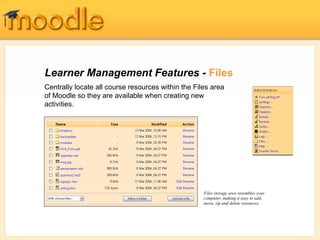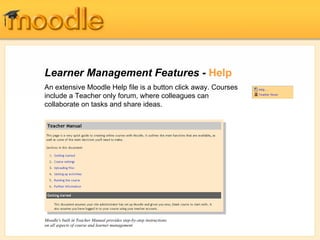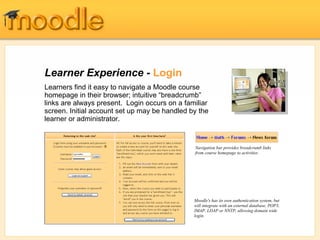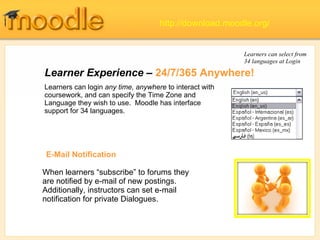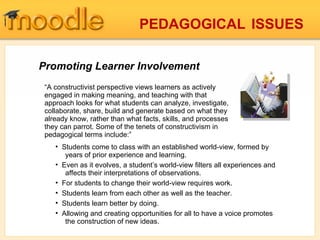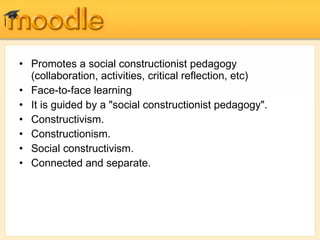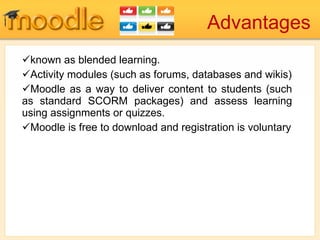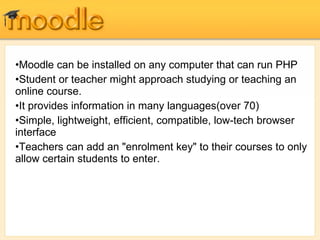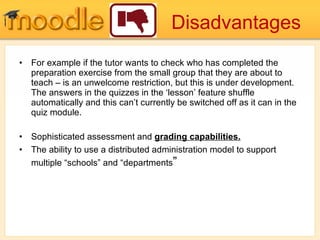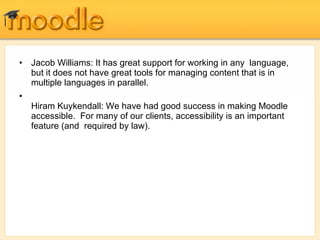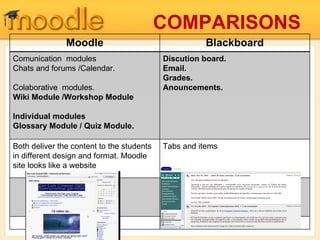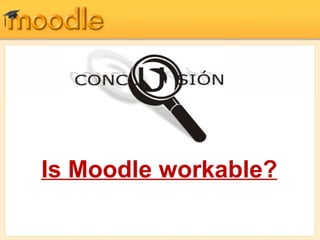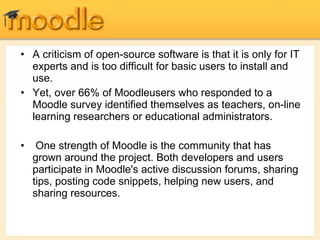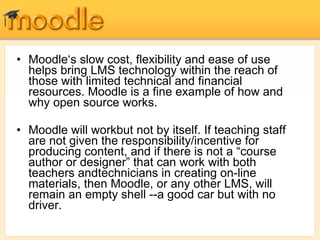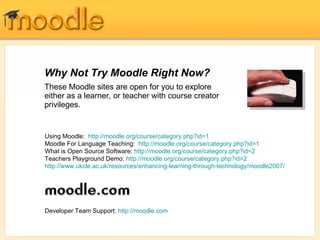Moodle
- 1. Moodle is a Course Management System (CMS), also known as a Learning Management System (LMS) or a Virtual Learning Environment (VLE). It is a Free web application that educators can use to create effective online learning sites. The focus of the Moodle project is always on giving educators the best tools to manage and promote learning, but there are many ways to use Moodle: (abbreviation for Modular Object-Oriented Dynamic Learning Environment )
- 2. Moodle Architecture Activities are at the heart of a course management system. Moodle was designed by an educator and computer scientist, with âsocial constructionistâ principles in mind. âConstructionism asserts that learning is particularly effective when constructing something for others to experience. This can be anything from a spoken sentence or an internet posting, to more complex artifacts like a painting, a house or a software package. The concept of social constructivism extends the above ideas into a social group constructing things for one another, collaboratively creating a small culture of shared artifacts with shared meanings. When one is immersed within a culture like this, one is learning all the time about how to be a part of that culture, on many levels.â Martin Dougiamas Creator & Lead Developer
- 3. Moodle has features that allow it to scale to very large deployments and hundreds of thousands of students, yet it can also be used for a primary school or an education hobbyist. Many institutions use it as their platform to conduct fully online courses, while some use it simply to augment face-to-face courses (known as blended learning).
- 4. Who is Using Moodle? Over 1150 organizations in 81 countries had registered Moodle sites by April 2004 ( http://moodle.org/sites ). This number is growing by about 10% each month as educators and trainers learn the value of implementing open source Moodle. Moodle is an ideal online learning solution for: "My first live class just ended and it was a tremendous success, both in the behavior of the program and the quality and longevity of my participants. Moodle has been terrific to work with. Somehow it doesn't seem to be as tedious to work with as other courseware programs such as Blackboard and WebCT." - Paula Edmiston, Trainer K-12 Schools Colleges Universities Governmental Agencies Businesses Trade Associations Hospitals Libraries Employment Agencies
- 5. Course Management Features - Modules Assignment Used to assign online or offline tasks; learners can submit tasks in any file format (e.g. MS Office, PDF, image, a/v etc.). Chat Allows real-time synchronous communication by learners. Choice Instructors create a question and a number of choices for learners; results are posted for learners to view. Use this module to do quick surveys on subject matter. Dialogue Property screens guide instructor through setup when creating a new Assignment Assignment activity can require the learner to upload a completed project. Allows for one-to-one asynchronous message exchange between instructor and learner, or learner to learner. Features
- 6. Course Management Features - Modules Forums Threaded discussion boards for asynchronous group exchange on shared subject matter. Participation in forums can be an integral part of the learning experience, helping students define and evolve their understanding of subject matter. Students can Rate a forum post, based on Scales set up by the course creator
- 7. Course Management Features - Modules Glossary Create a glossary of terms used in a course. Has display format options including entry list, encyclopedia, FAQ, dictionary style and more. Journal Learners reflect, record and revise ideas. Label Add descriptions with images in any area of the course homepage. Lesson Allows instructor to create and manage a set of linked "Pages". Each page can end with a question. The student chooses one answer from a set of answers and either goes forward, backward or stays in the same place in the lesson. Glossary terms appear in highlight within all activity resources. Moodle includes its own site search engine.
- 8. Course Management Features - Modules Quiz Create all the familiar forms of assessment including true-false, multiple choice, short answer, matching question, random questions, numerical questions, embedded answer questions with descriptive text and graphics. Instructors have granular control in defining course assessments, and can import quiz questions from popular formats like Blackboard, IMS QTI and WebCT. Moodle also supports embedding audio into a quiz.
- 9. Course Management Features - Modules Resource The primary tool for bringing content into a course; may be plain text, uploaded files, links to the web, Wiki or Rich Text (Moodle has built-in text editors ) or a bibliography type reference. Survey This module aids an instructor in making online classes more effective by offering a variety of surveys (COLLES, ATTLS), including critical incident sampling. Workshop An activity for peer assessment of documents (Word, PP etc.) that students submit online. Participants can assess each otherâs project. Teacher makes final student assessment, and can control opening and closing periods. Moodle supports adding math expressions to a Resource activity, using the built-in HTML editor
- 10. Learner Management Features Creating learning content is only part of what a good course management system (CMS) must do. The CMS must manage learners in a variety of ways. Learner management includes: Access to information about learners in a course. Ability to segment participants into groups. Site, course and user calendar event scheduling. And so much moreâĶe.g. applying scales to different learner activities, managing grades, tracking user access logs and uploading external files for use within the course etc.
- 11. Learner Management Features â Participants One click and you can view activity from all participants enrolled in the course. Learners create a personal profile that can include a picture, helping connect students socially in the online learning community. Learners complete a personal profile page that helps build the online learning community. Adding a picture and details to the profile creates a social connection. Groups Moodle allows the course instructor to easily create group categories, and determine how members will interact with each other and within various activities .
- 12. Learner Management Features - Calendar Keeping a calendar of events is important to both the learner and course instructor. Events can be created for different categories, including: Upcoming Events appear on the course homepage, alerting the learner across all courses they are enrolled in of different category events. Alerts are color-coded by category. Global events that appear in all courses (system admin). Course events set by an instructor. Group events set by instructor relative only to a group. User events set by learner (e.g. due dates, personal etc.).
- 13. Learner Management Features â Admin The Administration control panel puts all important learner management functions a single click away. Teachers and Students can be manually enrolled or removed from a course. Configuration of course Backup and Restore is achieved on a single screen. Restoring an existing course or Uploading a file archive from storage is accomplished with a single mouse click. Moodle makes it easy to re-use and share courses with other teachers. Backup can include or exclude student files and course data.
- 14. Learner Management Features - Scales Instructors may define custom Scales to be used for grading Forums , Assignments and Journals . Standard scales include assigning a value from 1-100% for each submission (or no grade), and indicating whether the learner was demonstrating one of three characteristics in the activity: Custom scales allow the instructor to fine tune their grading for specific content. Easily create several types of scales, and connect them with different activities you Add to the course. Shows mostly CONNECTED knowing. Shows mostly SEPARATE knowing. Equally separate and connected.
- 15. Learner Management Features â Grades-Logs The Grades feature in Moodle provides a quick view of all Forum, Assignment, Journal, Quiz, Lesson and Workshop grades. The grading scale applied to a learnerâs submission is shown, along with a cumulative total, on a single page. Grades can be downloaded in Excel or plain text for inclusion into an existing electronic gradebook Monitor when and what course resources the learner has accessed. Moodle's Logs provide detailed learner activity.
- 16. Learner Management Features - Files Centrally locate all course resources within the Files area of Moodle so they are available when creating new activities. Files storage area resembles your computer, making it easy to add, move, zip and delete resources.
- 17. Learner Management Features - Help An extensive Moodle Help file is a button click away. Courses include a Teacher only forum, where colleagues can collaborate on tasks and share ideas. Moodle's built in Teacher Manual provides step-by-step instructions on all aspects of course and learner management
- 18. Learner Experience - Login Learners find it easy to navigate a Moodle course homepage in their browser; intuitive âbreadcrumbâ links are always present. Login occurs on a familiar screen. Initial account set up may be handled by the learner or administrator. Moodle's has its own authentication system, but will integrate with an external database, POP3, IMAP, LDAP or NNTP, allowing domain wide login. Navigation bar provides breadcrumb links from course homepage to activities
- 19. Learner Experience â 24/7/365 Anywhere! Learners can select from 34 languages at Login Learners can login any time, anywhere to interact with coursework, and can specify the Time Zone and Language they wish to use. Moodle has interface support for 34 languages. http://download.moodle.org/ When learners âsubscribeâ to forums they are notified by e-mail of new postings. Additionally, instructors can set e-mail notification for private Dialogues. E-Mail Notification
- 20. Promoting Learner Involvement â A constructivist perspective views learners as actively engaged in making meaning, and teaching with that approach looks for what students can analyze, investigate, collaborate, share, build and generate based on what they already know, rather than what facts, skills, and processes they can parrot. Some of the tenets of constructivism in pedagogical terms include:â Students come to class with an established world-view, formed by years of prior experience and learning. Even as it evolves, a studentâs world-view filters all experiences and affects their interpretations of observations. For students to change their world-view requires work. Students learn from each other as well as the teacher. Students learn better by doing. Allowing and creating opportunities for all to have a voice promotes the construction of new ideas. PEDAGOGICAL ISSUES
- 21. Promotes a social constructionist pedagogy (collaboration, activities, critical reflection, etc) Face-to-face learning It is guided by a "social constructionist pedagogy". Constructivism. Constructionism. Social constructivism. Connected and separate.
- 22. Advantages known as blended learning. Activity modules (such as forums, databases and wikis) Moodle as a way to deliver content to students (such as standard SCORM packages) and assess learning using assignments or quizzes. Moodle is free to download and registration is voluntary
- 23. Moodle can be installed on any computer that can run PHP Student or teacher might approach studying or teaching an online course. It provides information in many languages(over 70) Simple, lightweight, efficient, compatible, low-tech browser interface Teachers can add an "enrolment key" to their courses to only allow certain students to enter.
- 24. Disadvantages For example if the tutor wants to check who has completed the preparation exercise from the small group that they are about to teach â is an unwelcome restriction, but this is under development. The answers in the quizzes in the âlessonâ feature shuffle automatically and this canât currently be switched off as it can in the quiz module. Sophisticated assessment and grading capabilities. The ability to use a distributed administration model to support multiple âschoolsâ and âdepartments â
- 25. Jacob Williams: It has great support for working in any language, but it does not have great tools for managing content that is in multiple languages in parallel. Hiram Kuykendall: We have had good success in making Moodle accessible. For many of our clients, accessibility is an important feature (and required by law).
- 26. COMPARISONS Moodle Blackboard Comunication modules Chats and forums /Calendar. Colaborative modules. Wiki Module /Workshop Module Individual modules Glossary Module / Quiz Module. Discution board. Email. Grades. Anouncements. Both deliver the content to the students in different design and format. Moodle site looks like a website Tabs and items
- 28. A criticism of open-source software is that it is only for IT experts and is too difficult for basic users to install and use. Yet, over 66% of Moodleusers who responded to a Moodle survey identified themselves as teachers, on-line learning researchers or educational administrators. One strength of Moodle is the community that has grown around the project. Both developers and users participate in Moodle's active discussion forums, sharing tips, posting code snippets, helping new users, and sharing resources.
- 29. Moodleâs slow cost, flexibility and ease of use helps bring LMS technology within the reach of those with limited technical and financial resources. Moodle is a fine example of how and why open source works. Moodle will workbut not by itself. If teaching staff are not given the responsibility/incentive for producing content, and if there is not a âcourse author or designerâ that can work with both teachers andtechnicians in creating on-line materials, then Moodle, or any other LMS, will remain an empty shell --a good car but with no driver.
- 30. Why Not Try Moodle Right Now? These Moodle sites are open for you to explore either as a learner, or teacher with course creator privileges. Using Moodle: http://moodle.org/course/category.php?id=1 Moodle For Language Teaching: http://moodle.org/course/category.php?id=1 What is Open Source Software: http://moodle.org/course/category.php?id=2 Teachers Playground Demo: http://moodle.org/course/category.php?id=2 http://www.ukcle.ac.uk/resources/enhancing-learning-through-technology/moodle2007/ Developer Team Support: http://moodle.com



